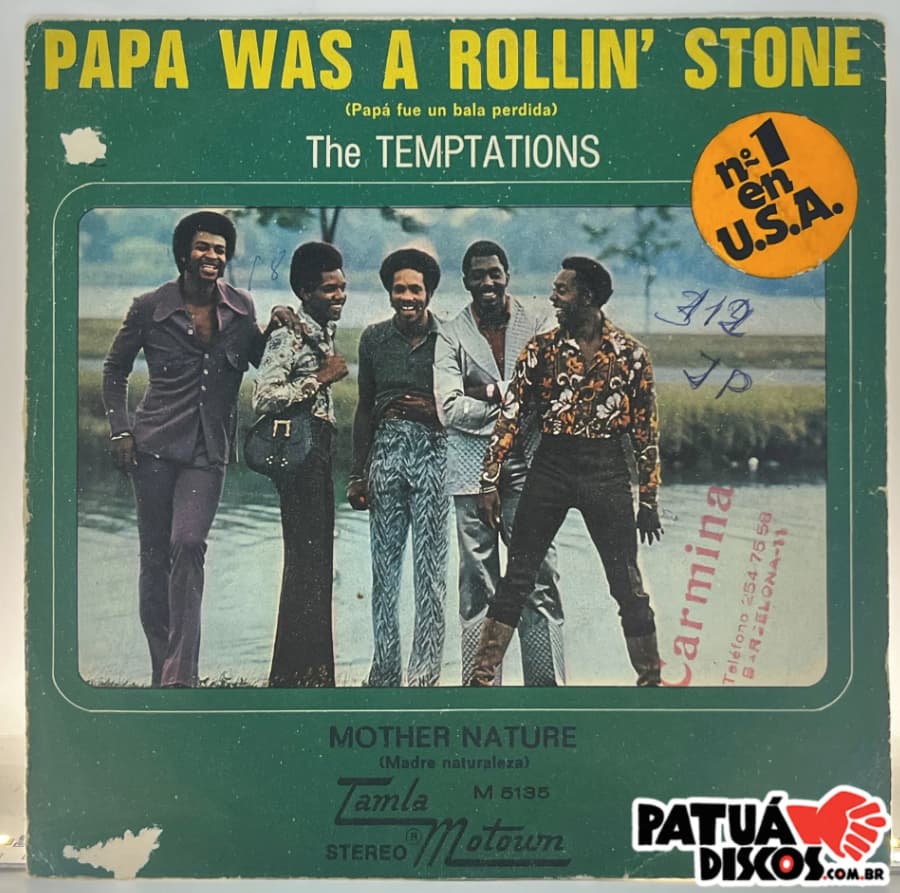
The Temptations: “Papa Was a Rollin’ Stone”
“Papa Was a Rollin’ Stone,” a soul classic by The Temptations, is a song that resonates deeply with fans of Motown and beyond. Originally written by Norman Whitfield and Barrett Strong in 1971, this track became an iconic piece of music history when the Temptations released their version in 1972. The song soared to the top of the Billboard Hot 100, securing a number-one spot and solidifying its place as a timeless masterpiece.
The journey of “Papa Was a Rollin’ Stone” begins with its initial recording by the Undisputed Truth in 1972, which did not gain much traction. However, when Whitfield reimagined the song for the Temptations, transforming it into a 12-minute epic, its fate changed dramatically. This reworked version was featured on their album All Directions and quickly became a sensation, winning three Grammy Awards in 1973. It not only topped the Billboard Hot 100 but also achieved the fifth position on the U.S. R&B charts.
The Temptations’ rendition of the song is noted for its extended instrumental introduction, lasting nearly four minutes. This introduction sets the stage with a haunting, repetitive bassline, complemented by hi-hat cymbals and a gradual build-up of various instruments, including a blues guitar, wah-wah guitar, electric piano, handclaps, strings, and a solo trumpet. This meticulous orchestration creates a rich tapestry of sound that underpins the vocal performance.
The vocal duties in “Papa Was a Rollin’ Stone” are shared among the group members in an ensemble style. Dennis Edwards, Melvin Franklin, Richard Street, and Damon Harris alternate lines, portraying siblings questioning their mother about their absent father. The song’s narrative is poignant and evocative, with the repeated refrain, “Papa was a rollin’ stone / Wherever he laid his hat was his home / And when he died, all he left us was alone,” painting a somber picture of abandonment and loss.
The recording of this song was not without its challenges. The Temptations were reportedly frustrated with Whitfield’s focus on elaborate instrumentation over their vocal contributions. Tensions ran high, especially for Edwards, who had to re-record his parts numerous times to capture the desired emotional intensity. This friction ultimately led to Whitfield’s departure as their producer.
Musically, “Papa Was a Rollin’ Stone” stands as a monumental work in the soul genre. Its length and complexity were innovative for the time, aligning it with the “cinematic soul” tradition popularized by artists like Isaac Hayes. The song’s influence extended beyond its immediate success, paving the way for extended tracks in disco and house music.
The song’s reception was overwhelmingly positive, with critics and fans alike praising its artistry. It was inducted into the Grammy Hall of Fame in 1999, a testament to its enduring legacy. Kelefa Sanneh, a notable music critic, described it as “nearly seven glorious minutes long (the album version was twelve) sustained by little more than a perfect bassline and a few artfully placed hand claps.” Stereogum hailed it as “a monolith. A towering monument out of tense hi-hats and pulsating bass and shivering strings and hard-strutting chicken-scratch guitars and panicked trumpet-blasts.”
“Papa Was a Rollin’ Stone” remains a standout track in the Temptations’ catalog and in the broader landscape of soul music. Its innovative production, compelling narrative, and emotional depth ensure that it will continue to be celebrated for generations to come.